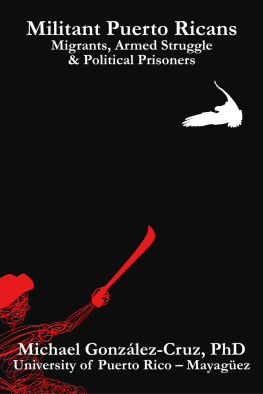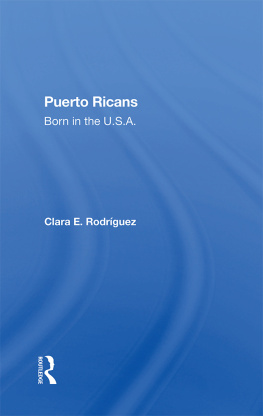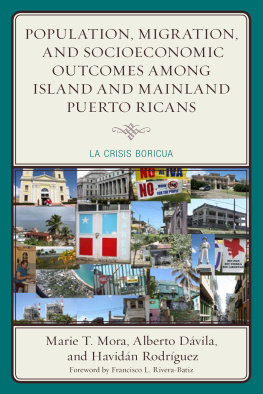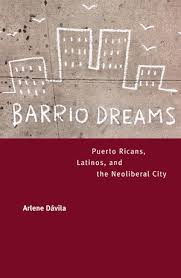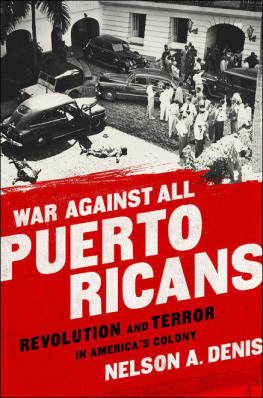Puerto Ricans in the Empire
Puerto Ricans in the Empire
Tobacco Growers and U.S. Colonialism
TERESITA A. LEVY
RUTGERS UNIVERSITY PRESS
NEW BRUNSWICK, NEW JERSEY, AND LONDON
Library of Congress Cataloging-in-Publication Data
Levy, Teresita A.
Puerto Ricans in the empire : tobacco growers and U.S. colonialism / Teresita A. Levy.
pages cm
Includes bibliographical references and index.
ISBN 9780813571331 (hardcover : alk. paper) ISBN 9780813571324 (pbk. : alk. paper) ISBN 9780813571348 (e-book)
1. Tobacco industryPuerto RicoHistory. 2. TobaccoPolitical aspectsPuerto RicoHistory. 3. Puerto RicoForeign economic relationsUnited States. 4. United StatesForeign economic relationsPuerto Rico. 5. Puerto RicoPolitics and government18981952. 6. Puerto RicoHistory18981952. I. Title.
HD9144.P82L49 2015
338.1'737109729509041dc23 2014014278
A British Cataloging-in-Publication record for this book is available from the British Library.
Copyright 2015 by Teresita A. Levy
All rights reserved
No part of this book may be reproduced or utilized in any form or by any means, electronic or mechanical, or by any information storage and retrieval system, without written permission from the publisher. Please contact Rutgers University Press, 106 Somerset Street, New Brunswick, NJ 08901. The only exception to this prohibition is fair use as defined by U.S. copyright law.
Visit our website: http://rutgerspress.rutgers.edu.
Manufactured in the United States of America
For my late father, Luis Levy Fiol, who taught me about our past
For my sons, Ari Miguel and Iln Andrs, who imagine our future
It is a privilege to be part of a community of scholars, artists, friends, and family in New York and Puerto Rico, and a simple gracias is not enough to convey the profound sense of gratitude that overwhelms me as I sit to write this page. Nevertheless, gracias I must give to the people who provided support, wisdom, and laughter while I was working on this project.
The archival research that informs this book would not have been possible without the assistance of the staff at the Centro de Investigaciones Histricas at the University of Puerto Rico, the Archivo Histrico de Caguas, the Archivo Notarial de Caguas, and the Archivo General de Puerto Rico. I will never forget their hospitality and their patience. I was fortunate to spend many weeks at the library of the Estacin Experimental Agrcola de Puerto Rico, immersed in agricultural research and enjoying in equal parts the generosity of the staff and the glorious Jardn Botnico in the complex. I also thank the Asociacin de Agricultores Puertorriqueos, who allowed the use of their organizations materials for this work.
My students at Lehman College have been a source of inspiration and intellectual renewal for the last seven years, and I thank them for joining me in the classroom. I am grateful for the many hallway chats, cafecitos, and debates about teaching and learning that I have enjoyed with my colleagues in the department of Latin American, Latino, and Puerto Rican Studies. I have shared much hard work, and a little desk space, with my dear friends at the Center for Latin American, Caribbean, and Latino Studies at The Graduate Center of the City University of New York. I thank them for the stimulating intellectual debates, their endless curiosity, and their friendship.
My lifelong friends and my family in Puerto Rico, who I am so lucky to see regularly, were a constant reminder that I was not just writing about the Puerto Rican people; I was writing about them, their history, and their legacy, as well as mine, and such an endeavor carried an enormous intellectual responsibility. They made sure I was current on the joys and difficulties of living on the island, and I thank them for keeping me so very connected to mi tierra.
Every day, I am enveloped in the love, confidence, and unconditional support of my husband, Benjamin Lapidus, and our sons, Ari Miguel and Iln Andrs. I am grateful for their patience and their curiosity, but most of all, for joining me in the adventure that is our life.
Puerto Ricans in the Empire
Colonial power, like any other, was an object of struggle and depended on the material, social, and cultural resources of those involved.
Frederick Cooper
In December 1925, the editors of El Agricultor Puertorriqueo, the magazine of the one-year-old Asociacin de Agricultores Puertorriqueos, announced: The time has come to proclaim that we have the undisputed right to intervene, cooperate, and discuss our administrative problems, our economic problems, our agricultural problems that greatly influence the general welfare of the community. With this declaration, the membership of the Asociacin publicly affirmed their commitment to advocate in the legislative halls of the colonial empire on behalf of all Puerto Rican farmers. Farmers across the island, especially tobacco growers, heeded the call to action and affiliated with the Asociacin and other agricultural groups. Subsequently, they lobbied for legislation and funding, participated in government-sponsored agricultural programs, solicited agricultural credit from governmental sources, and sought scientific education in a variety of public programs, all to improve their opportunities for successful participation in the tobacco leaf market of the United States.
Using the tobacco sector in Puerto Rico as a focal point of research, this book examines the complex and varied ways in which Puerto Ricans participated in and negotiated with the U.S. colonial structures established on the island after 1898. The relationship between Puerto Rico and the United States was undoubtedly colonial in nature, but paradoxically it also conferred a new set of rights, privileges, and freedoms on the Puerto Rican population.a colonized people may negotiate with the empire that rules them, and this was clearly the case in Puerto Rico. However, this does not mean that colonial structures necessarily limited the ability to negotiate constantly, passionately, and often successfully. Tobacco growers, through their affiliation with the Asociacin de Agricultores Puertorriqueos, repeatedly demanded that U.S. officials in Washington and on the island protect the tobacco sector and the well-being of the people involved in its production. In response, U.S. administrators included Puerto Ricans in decision-making processes, altered and extended legislation to the island, and allocated funding to support scientific experimentation that would improve the quality of agricultural products. The interactions between tobacco growers and the colonial government demonstrate that the colonial relationship between the island and the mainland was not unilaterally defined or manifested. Instead, the colonial process was a dynamic, elastic, and ever-changing one, where local actors often affected colonial policies.
The inclusion of the island in the tariff structure of the United States guaranteed the duty-free entrance of many island products into the U.S. market, and this dramatically accelerated the existing production of agricultural commodities. Tobacco became a major industry in Puerto Rico in large part because tobacco leaf was included in this tariff exemption. Puerto Rican farmers in the highland regions of the island made the cultivation of tobacco for the U.S. market their most important economic activity after 1900.
This book begins, therefore, by systematically exploring tobacco leaf cultivation for the U.S. market in order to understand the intricacies of how the sector expanded and how tobacco farmers (and their families) adjusted to the changes in their lives. Although U.S. economic policies and the dominant role of the American Tobacco Company in cigar and cigarette production had a profound impact on the tobacco sector, the cultivation of the leaf remained almost entirely controlled by Puerto Rican farmers. Tobacco cultivation required a large number of agricultural workers, and together with industrial workers in tobacco shops, they made the tobacco sector one of the largest employers in rural Puerto Rico.



